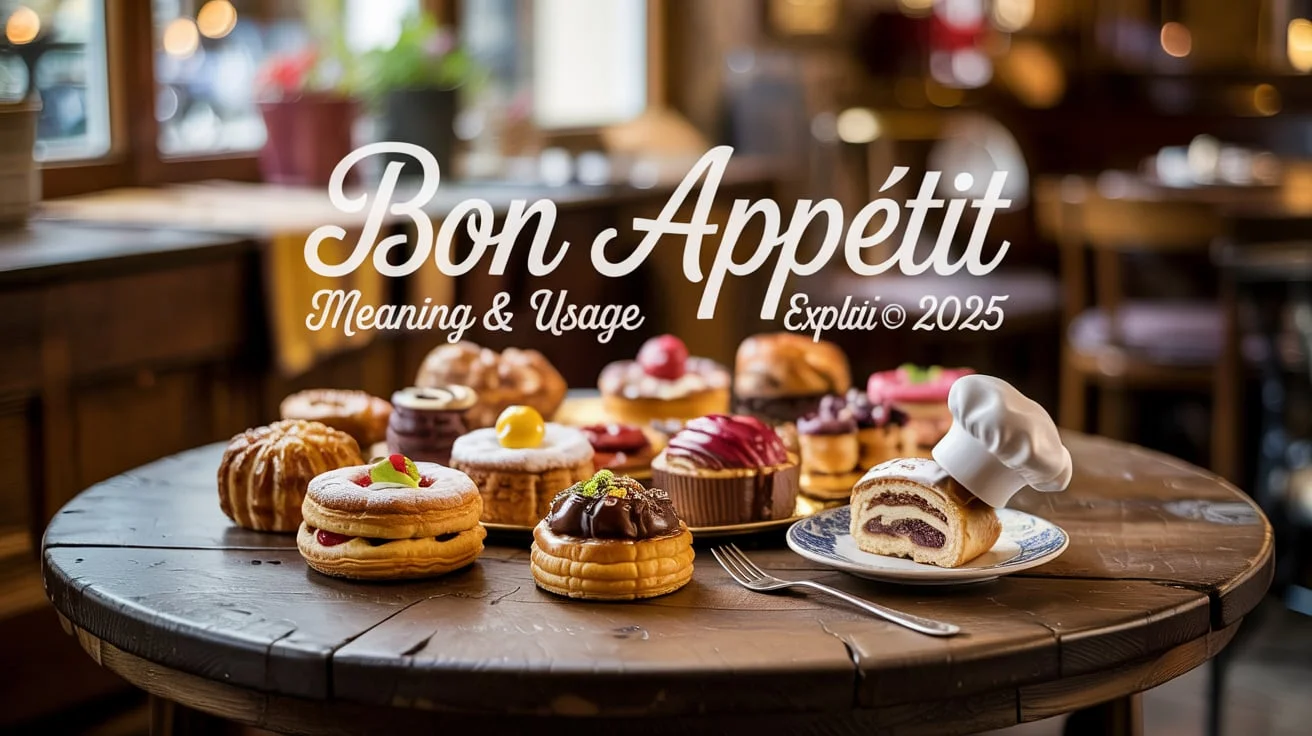When someone says “Bon Appétit,” it sounds classy, doesn’t it? Whether you’re at a fine dining restaurant or watching your favorite cooking show, this French phrase often pops up right before someone takes their first bite. But what does it really mean, where does it come from, and what are some other ways to say it? Let’s explore this delightful phrase in detail.
🔍 What Does Bon Appétit Mean?
“Bon Appétit” is a French expression that literally translates to “Good Appetite.” It’s a polite and cheerful way to wish someone an enjoyable meal — similar to saying, “Enjoy your food” in English.
👉 Pronunciation:
bon appétit = bohn ah-peh-tee
It’s used right before someone starts eating and shows good manners, warm hospitality, and respect for food.
🇫🇷 Origin and Cultural Significance

The phrase comes from French dining culture, where meals are cherished, and eating is considered a shared, enjoyable experience. Saying Bon Appétit is not just good etiquette — it’s a reflection of the importance the French place on culinary enjoyment.
In France and many other parts of Europe, meals are social rituals. Saying Bon Appétit is like saying, “Let’s appreciate this food and moment together.”
🍽️ Is Bon Appétit Used in English Too?
Yes, absolutely. Even though it’s French, Bon Appétit is widely used in English-speaking countries, especially in contexts that involve:
- Fine dining
- Cooking shows
- Dinner parties
- Food blogs or YouTube channels
It adds a touch of sophistication and makes the moment feel special.
🧠 When and How to Use Bon Appétit?
You can use Bon Appétit whenever you want to wish someone a good meal in a friendly or formal setting.
✅ Appropriate Situations:
| Situation | Example |
| Hosting a dinner | “Dinner is served! Bon Appétit!” |
| Serving food at a restaurant | “Here’s your pasta. Bon Appétit!” |
| Eating with colleagues/friends | “Let’s eat! Bon Appétit, everyone!” |
| Cooking video or blog | “Try this recipe at home — and bon appétit!” |
❌ Don’t use when:
- Food hasn’t been served yet
- It’s a casual, non-meal moment
- You’re not sharing the mealtime with someone
🤔 Is It Rude Not to Say Bon Appétit?

Not necessarily. In English-speaking cultures, saying “Enjoy your meal” or even saying nothing at all is okay. But in French etiquette, especially in more formal or traditional settings, not saying Bon Appétit could be seen as a bit cold or inattentive.
That said, no one will take offense if you skip it — but using it adds a nice human touch.
🌍 Bon Appétit Meaning in Different Languages
Let’s look at some alternatives to Bon Appétit from around the world:
| Language | Phrase | English Translation |
| French | Bon Appétit | Enjoy your meal |
| Italian | Buon Appetito | Good appetite |
| Spanish | Buen provecho | Enjoy your food |
| German | Guten Appetit | Have a good appetite |
| Arabic | بالهنا والشفا (Bil hana wa shifa) | With joy and healing |
| Urdu | خوش مزہ کھائیں | Enjoy the delicious meal |
| Hindi | भोजन का आनंद लें | Enjoy your food |
| Japanese | いただきます (Itadakimasu) | I humbly receive (before eating) |
| Korean | 잘 먹겠습니다 (Jal meokgesseumnida) | I will eat well |
💬 Other English Alternatives to Bon Appétit
If you want to sound warm and friendly without using French, try these phrases:
| Casual Phrases | Formal or Unique Alternatives |
| “Enjoy your meal!” | “Wishing you a delightful meal.” |
| “Dig in!” | “Hope you enjoy every bite.” |
| “Let’s eat!” | “May your meal be as lovely as you!” |
| “Tuck in!” (UK English) | “Dinner is served, please enjoy.” |
| “Chow time!” | “Your meal awaits, bon appétit!” |
These phrases work great depending on your tone and setting.
🧑🍳 Is It Okay to Say Bon Appétit at Home?

Absolutely! You don’t need to be in a five-star restaurant. Using Bon Appétit at home:
- Adds warmth to family meals
- Encourages mindfulness while eating
- Makes mealtime more memorable
Even saying it to yourself before eating a solo lunch can boost your mood and build a healthy eating habit.
⚠️ Fun Fact: Controversy Around Bon Appétit?
Interestingly, in 2019, some etiquette experts in France said saying “Bon Appétit” is unnecessary or even rude in ultra-formal settings — as it reminds people of their bodily functions (i.e., digestion).
But don’t worry — in everyday life, Bon Appétit is totally fine and often appreciated.
❤️ Why Saying Bon Appétit Matters

Saying Bon Appétit is more than just manners — it shows:
- Gratitude for the food
- Respect for the cook
- Connection with others at the table
- Positive mindset before eating
It turns any ordinary meal into a mini celebration.
📌 Quick Recap: Key Takeaways
| Topic | Summary |
| Meaning | Bon Appétit = “Good Appetite” in French |
| Use Case | Said before meals to wish someone enjoyment |
| Pronunciation | bohn ah-peh-tee |
| Language Reach | Used globally across many cultures |
| Cultural Value | Especially important in French and European dining culture |
| Alternatives | “Enjoy your meal”, “Dig in”, “Buon Appetito”, “Buen provecho”, etc. |
| Formal vs. Casual | Can be used in both, depending on tone |
| Human Connection | Adds warmth, gratitude, and hospitality to every meal moment |
🙋♀️ FAQs About Bon Appétit
1. What language is Bon Appétit from?
Bon Appétit is from French, commonly used worldwide as a way to say “enjoy your meal.”
2. Is it rude to say Bon Appétit in English?
Not at all. In fact, it’s often appreciated and adds a friendly touch — even in English-speaking settings.
3. Can I use Bon Appétit in a text or message?
Yes! Especially if you’re sharing a food photo, recipe, or inviting someone for a meal. Example: “Try this biryani tonight — bon appétit!”
4. Is Bon Appétit used in restaurants only?
No. You can use it at home, at work, or at casual lunches — anywhere food is shared.
5. What’s a fun way to say Bon Appétit?
Try: “Let the feast begin!” or “Get your forks ready!” — both are playful and human-friendly!
🍷 Final Thought: Make Mealtimes Special with Just Two Words
In a world moving fast, pausing to say “Bon Appétit” helps us slow down and appreciate the little things — like a warm meal, good company, or even a peaceful solo lunch.
It may just be two words, but it carries warmth, hospitality, and tradition — across languages and generations.
So next time you sit down to eat… go ahead and say it:















